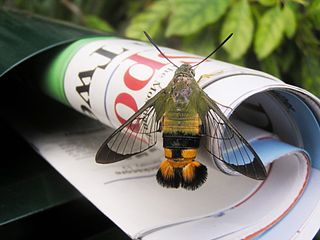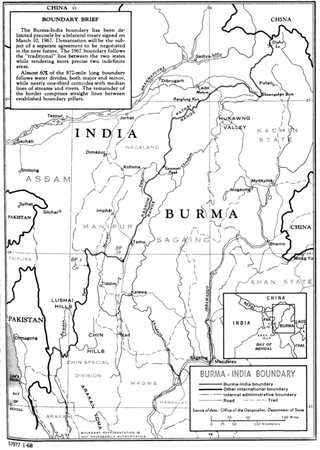
Myanmar, officially the Republic of the Union of Myanmar, also known as Burma, is a country in Southeast Asia. It is the largest country by area in Mainland Southeast Asia and has a population of about 55 million. It is bordered by Bangladesh and India to its northwest, China to its northeast, Laos and Thailand to its east and southeast, and the Andaman Sea and the Bay of Bengal to its south and southwest. The country's capital city is Naypyidaw, and its largest city is Yangon.

Sagaing Region is an administrative region of Myanmar, located in the north-western part of the country between latitude 21° 30' north and longitude 94° 97' east. It is bordered by India's Nagaland, Manipur, and Arunachal Pradesh States to the north, Kachin State, Shan State, and Mandalay Region to the east, Mandalay Region and Magway Region to the south, with the Ayeyarwady River forming a greater part of its eastern and also southern boundary, and Chin State and India to the west. The region has an area of 93,527 square kilometres (36,111 sq mi). In 1996, it had a population of over 5,300,000 while its population in 2012 was 6,600,000. The urban population in 2012 was 1,230,000 and the rural population was 5,360,000. The capital city of Sagaing Region is Sagaing.

This list of Buddhism by country shows the distribution of the Buddhist religion, practiced by about 535 million people as of the 2010s, representing 7% to 8% of the world's total population.

The Anglo-Burmese Wars were a clash between two expanding empires, the British Empire and the Konbaung Dynasty, that became British India‘s most expensive and longest war, costing 5–13 million pounds sterling and spanning over 60 years. There were three Burmese Wars or Anglo-Burmese Wars:
Tamu is a town in the Kabaw Valley in the Sagaing Region in north-west Myanmar near the border with the eastern Indian state of Manipur. It is a principal town of the Kabaw Valley and the seat of administration for the Tamu Township. Opposite the Indian town of Moreh, it is home to an official border trade posts with India, which opened on 12 April 2005. In 2022, total trade volume at the border post stood at US$15.134 million.
Thant Myint-U is a Burmese-American historian, writer, grandson of former United Nations Secretary-General U Thant, former UN official, and former special adviser to the president for the peace process. He has authored five books, including The River of Lost Footsteps: A Personal History of Burma and Where China Meets India: Burma and the New Crossroads of Asia. He founded the Yangon Heritage Trust in 2012 to protect colonial architecture and lobby for urban planning in the Burmese commercial capital of Yangon. He is currently a Distinguished Visiting Scholar at Christ's College, Cambridge and United Nations Special Adviser on Humanitarian Diplomacy.

Pilikula Nisargadhama is a multi-purpose tourist attraction, at Vamanjoor, eastern part of Mangalore city in Karnataka, managed by the District Administration of Dakshina Kannada. It is a major tourist attraction of Mangalore. It attracts large number of tourists due to the availability of multiple facilities.

Cricket is by far the most popular sport in Karnataka with International cricket matches attracting a sizeable number of spectators who are willing to pay more than the standard ticket price to get a chance to watch the match. The sports related infrastructure is mainly concentrated in Bangalore which also played host to the 4th National Games of India in the year 1997. Bangalore is also the location of the Sports Authority of India (SAI) which is the premier sports institute in the country. Karnataka is sometimes referred to as the cradle of Indian swimming because of high standards in swimming compared to other states.

Canthium is a genus of flowering plants in the family Rubiaceae. They are shrubs and small trees. The leaves are deciduous and the stems are usually thorny.

Palm-leaf manuscripts are manuscripts made out of dried palm leaves. Palm leaves were used as writing materials in the Indian subcontinent and in Southeast Asia dating back to the 5th century BCE. Their use began in South Asia and spread to other regions, as texts on dried and smoke-treated palm leaves of the Palmyra palm or the talipot palm. Their use continued until the 19th century when printing presses replaced hand-written manuscripts.

Vanguerieae is a tribe of flowering plants in the family Rubiaceae and contains about 655 species in 30 genera. It is one of the most species-rich groups within the family and it is distributed across the Paleotropics.

Cephonodes kingii, the gardenia bee hawk, is a moth of the family Sphingidae.
John Richard Lobo, popularly known as J. R. Lobo, is an Indian politician with the Indian National Congress and former MLA of Mangalore South constituency in Karnataka, India. MLA J.R Lobo proposed the installation of musical fountain with laser show at Kadri Park, which is the largest lung space in the city. J.R Lobo also proposed the construction of the 3D 8K Planetarium at Pilikula in Mangalore, which was inaugurated in March 2018.
Vateria indica oil is extracted from the seeds of the Vateria indica plant, a species in the family Dipterocarpaceae. The Vateria indica plant is indigenous to the Western Ghats, Kerala and Tamil Nadu regions of India. It thrives in the evergreen forests, surviving up to 800 meters above sea level. Oil from the seeds of the plant is extracted through a chemical refining process which makes the plant edible.
Memecylon angustifolium, or blue mist, is a species of plant in the family Melastomataceae. It is native to India and Sri Lanka. Leaves are simple, opposite, decussate; lamina narrow linear-elliptic to linear-lanceolate; apex acute, base attenuate, with entire margin. Flowers are blue in color and show axillary umbels inflorescence. Fruit is a blackish purple, one-seeded berry.
The University Entrance Examination or Matriculation Examination is an academic examination administered to 10th standard students at all schools in Myanmar, including government schools, comprehensive schools and private boarding schools, for students seeking university admission. The test is administered at least 3 weeks after the Basic Education High School Examination. Test results determine the eligibility of high school students to pursue higher education, and their entrance into select universities and majors.

The city of Mangalore is proclaimed as the gateway to Karnataka and lies nestled between the blue waters of the Arabian Sea and the green, towering hills of the Western Ghats. The 184 square km city is spread out over the backwaters of the two rivers, Netravati and Gurpura.

Swami Vivekananda Planetarium, also called Pilikula Planetarium, at Pilikula Nisargadhama in Mangalore is the first 3D planetarium in India. It is also only such planetarium in the country with hybrid modern technology innovations coupled with 3D technology of 8K digital and opto-mechanical (hybrid) projection system. It is a part of the Pilikula Nisargadhama, which is also named Dr Shivaram Karanth Biological Park. It is planned and built to provide the best learning experience for students and enthusiasts on Zodiacal system of planets. Its creation is attributed to Pilikula Regional Science Centre.

Flacourtia montana is a plant in the family Salicaceae. It is native to southern Asia. The species presents as a tree up to 20 m in height.

The India–Myanmar border is the international border between India and Myanmar. The border is 1,643 kilometres (1,021 mi) in length and runs from the tripoint with China in the north to the tripoint with Bangladesh in the south.














